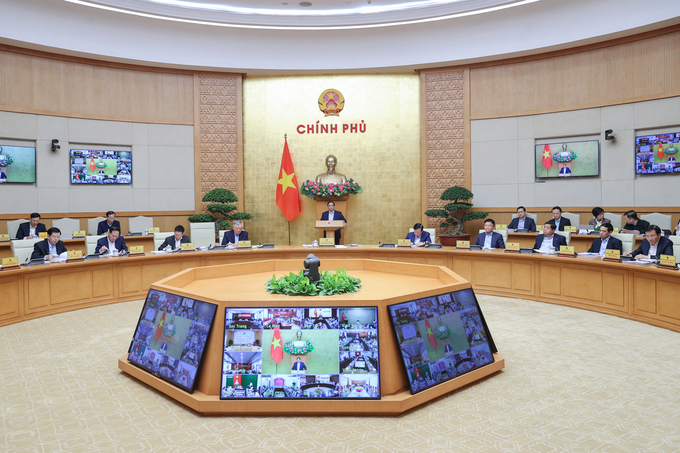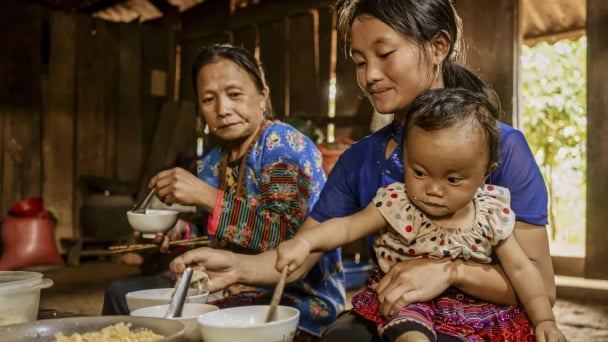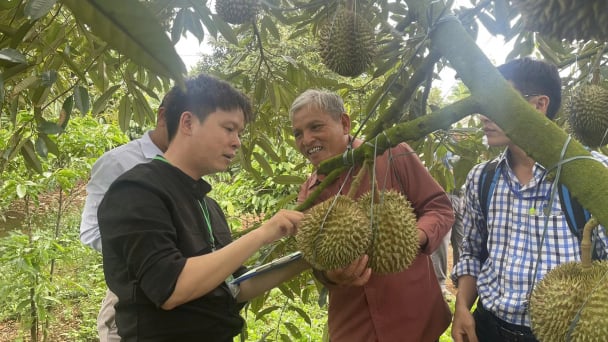June 1, 2025 | 18:20 GMT +7
June 1, 2025 | 18:20 GMT +7
Hotline: 0913.378.918
June 1, 2025 | 18:20 GMT +7
Hotline: 0913.378.918

On the morning of March 5, Prime Minister Pham Minh Chinh chaired the regular Government meeting for February 2025. Photo: VGP.
The meeting was held in person at the Government Headquarters and online with 13 provinces and cities in the Mekong Delta region.
According to the agenda, the meeting will assess the socio-economic situation in February and the first two months of the year; national target programs; the disbursement of public investment capital; the implementation of Government Resolution 25 on growth targets for sectors, industries, and localities to ensure the national growth target of at least 8% in 2025; and key directives for the coming period.
Also at the meeting, Prime Minister convened leaders of provinces and cities in the Mekong Delta to discuss rice production, consumption, and exports, as well as the implementation of transportation infrastructure projects, particularly ensuring material supply for projects in the southern region.
In his opening remarks, Prime Minister Pham Minh Chinh emphasized that at this time, there is a significant workload, while global developments remain rapid, complex, and unpredictable. Strategic competition is becoming increasingly intense, and several countries are adjusting their trade policies, especially tax policies, which impact global import-export activities, supply, and demand. Meanwhile, the global economy continues to face difficulties and is recovering slowly.
Domestically, we must both carry out and complete regular tasks while also focusing on restructuring the organizational apparatus in line with Resolution 18, preparing for the administrative boundary adjustments of localities as per the latest directives from the Politburo, promoting economic growth with a target of at least 8% in 2025, implementing Politburo Resolution 57 on science and technology, innovation, and digital transformation, and organizing major national celebrations.
In this context, under the leadership of the Party, directly and regularly guided by the Politburo and the Secretariat, headed by General Secretary To Lam with the participation of the entire political system, the oversight and support of the National Assembly, the backing of the people and businesses, and the assistance of international friends, we have maintained macroeconomic stability, controlled inflation, promoted growth, and ensured major economic balances. Social welfare has been secured, the material and spiritual well-being of the people has improved, political and social stability has been maintained, national defense and security have been strengthened, and diplomatic efforts have been enhanced.
However, we must not be complacent, negligent, or lose vigilance due to external developments, especially as the global economic recovery remains weak. Meanwhile, Vietnam is a developing country with a transitioning economy, a relatively small economic scale, high openness, and limited resilience to external shocks.
Therefore, the Prime Minister requested that government members and delegates focus on closely assessing the socio-economic situation, identifying emerging issues in February and the first two months of the year, highlighting both achievements and shortcomings, analyzing their causes, and drawing lessons from the implementation process at both central and local levels.
At the same time, it is essential to assess and analyze the context and key developments in March and the coming period, identifying emerging issues and Vietnam’s strategies to maintain macroeconomic stability, promote growth, and control inflation. In addition to effectively carrying out regular tasks, it is crucial to closely monitor the situation and flexibly and efficiently adapt to arising challenges.
In particular, the Prime Minister requested that delegates propose key leadership, direction, and governance priorities for the coming period to ensure that economic growth reaches at least 8% in 2025. This will play a vital role in the successful implementation of the 2021–2025 five-year socio-economic development plan, laying the groundwork, momentum, and foundation for the country to confidently enter a new era - an era of progress, building a prosperous, civilized, and thriving nation where people enjoy prosperity and happiness.
For the Ministry of Agriculture and Environment, direct localities in the Mekong Delta to ensure production meets the planned output and acreage targets. In the immediate term, focus on timely production and harvest of the winter-spring rice crop; closely monitor the cropping schedule and the salinity intrusion situation to minimize its impact on rice production.
The Prime Minister highlighted several specific issues that require attention in leadership and governance, such as the rice market situation, monetary policy, fiscal policy, interest rate management, public investment disbursement, and tax, fee, and charge policies to support businesses.
Translated by Kieu Chi

(VAN) 30 experts in health, agriculture and environment participated in a consultation workshop to inform the development of a methodological framework aimed at supporting Vietnam’s transition to a sustainable food system.

(VAN) Over the past five years, Quang Ninh Province has vigorously and synchronously implemented the ‘Say No to Plastic Waste’ campaign, yielding positive outcomes in advancing sustainable tourism.

(VAN) The prevention of plastic pollution necessitates collaboration among governments, businesses, and citizens. Today's little things contribute to a future free of plastic.

(VAN) This was the directive given by Deputy Minister Phung Duc Tien during a meeting with the Department of Livestock Production and Animal Health, and relevant stakeholders to prevent and control African swine fever.

(VAN) For the durian industry to succeed, the value chain must fulfill its commitments to the government, the community, and international partners.

(VAN) Vaccinating juvenile pangasius helps reduce disease, antibiotic use, and farming costs, increasing profits for export-oriented farmers in An Giang.

(VAN) Due to a limited supply of workforce and competitive recruitment requirements, businesses struggle to retain talented veterinary human resources.